Person-Centred Care: Conceptions of Belongingness, Communication, Emotional Intelligence, and Resilience
VerifiedAdded on 2022/12/05
|11
|3107
|416
AI Summary
This article discusses the concepts of belongingness, communication, emotional intelligence, and resilience in person-centred care. It explores how these concepts contribute to better health outcomes for patients and emphasizes the importance of person-centred care in nursing practice.
Contribute Materials
Your contribution can guide someone’s learning journey. Share your
documents today.
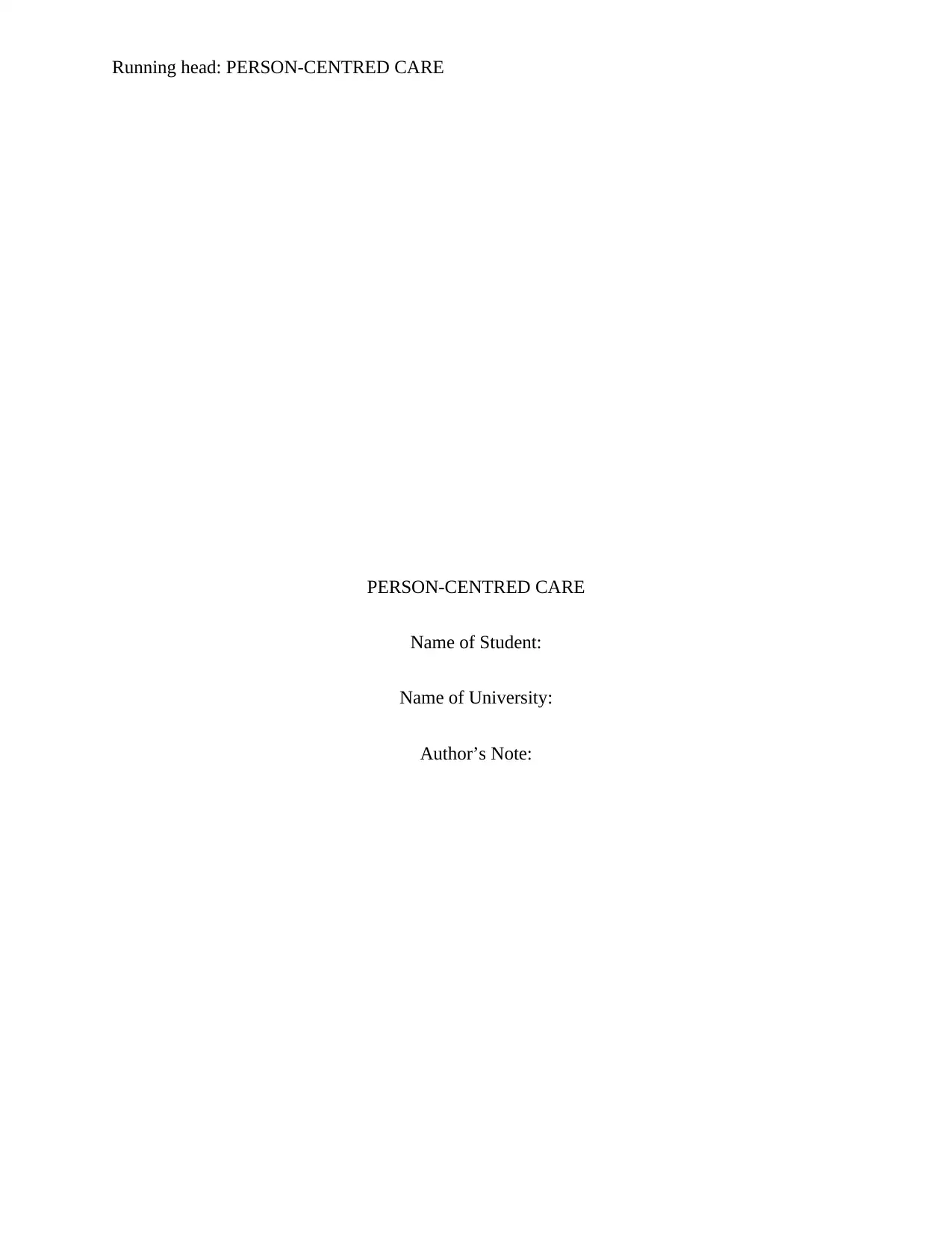
Running head: PERSON‐CENTRED CARE
PERSON‐CENTRED CARE
Name of Student:
Name of University:
Author’s Note:
PERSON‐CENTRED CARE
Name of Student:
Name of University:
Author’s Note:
Secure Best Marks with AI Grader
Need help grading? Try our AI Grader for instant feedback on your assignments.
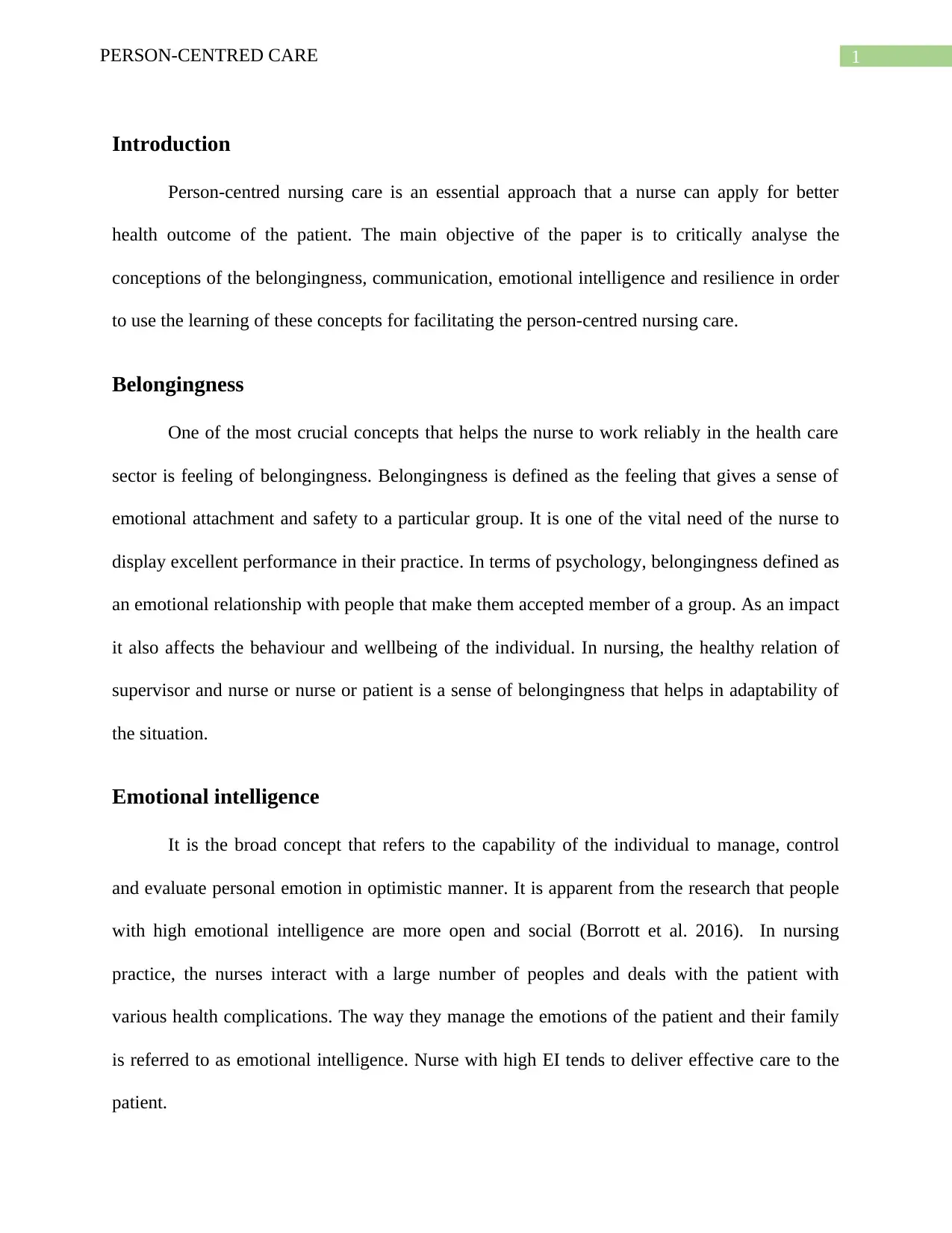
1PERSON‐CENTRED CARE
Introduction
Person-centred nursing care is an essential approach that a nurse can apply for better
health outcome of the patient. The main objective of the paper is to critically analyse the
conceptions of the belongingness, communication, emotional intelligence and resilience in order
to use the learning of these concepts for facilitating the person-centred nursing care.
Belongingness
One of the most crucial concepts that helps the nurse to work reliably in the health care
sector is feeling of belongingness. Belongingness is defined as the feeling that gives a sense of
emotional attachment and safety to a particular group. It is one of the vital need of the nurse to
display excellent performance in their practice. In terms of psychology, belongingness defined as
an emotional relationship with people that make them accepted member of a group. As an impact
it also affects the behaviour and wellbeing of the individual. In nursing, the healthy relation of
supervisor and nurse or nurse or patient is a sense of belongingness that helps in adaptability of
the situation.
Emotional intelligence
It is the broad concept that refers to the capability of the individual to manage, control
and evaluate personal emotion in optimistic manner. It is apparent from the research that people
with high emotional intelligence are more open and social (Borrott et al. 2016). In nursing
practice, the nurses interact with a large number of peoples and deals with the patient with
various health complications. The way they manage the emotions of the patient and their family
is referred to as emotional intelligence. Nurse with high EI tends to deliver effective care to the
patient.
Introduction
Person-centred nursing care is an essential approach that a nurse can apply for better
health outcome of the patient. The main objective of the paper is to critically analyse the
conceptions of the belongingness, communication, emotional intelligence and resilience in order
to use the learning of these concepts for facilitating the person-centred nursing care.
Belongingness
One of the most crucial concepts that helps the nurse to work reliably in the health care
sector is feeling of belongingness. Belongingness is defined as the feeling that gives a sense of
emotional attachment and safety to a particular group. It is one of the vital need of the nurse to
display excellent performance in their practice. In terms of psychology, belongingness defined as
an emotional relationship with people that make them accepted member of a group. As an impact
it also affects the behaviour and wellbeing of the individual. In nursing, the healthy relation of
supervisor and nurse or nurse or patient is a sense of belongingness that helps in adaptability of
the situation.
Emotional intelligence
It is the broad concept that refers to the capability of the individual to manage, control
and evaluate personal emotion in optimistic manner. It is apparent from the research that people
with high emotional intelligence are more open and social (Borrott et al. 2016). In nursing
practice, the nurses interact with a large number of peoples and deals with the patient with
various health complications. The way they manage the emotions of the patient and their family
is referred to as emotional intelligence. Nurse with high EI tends to deliver effective care to the
patient.
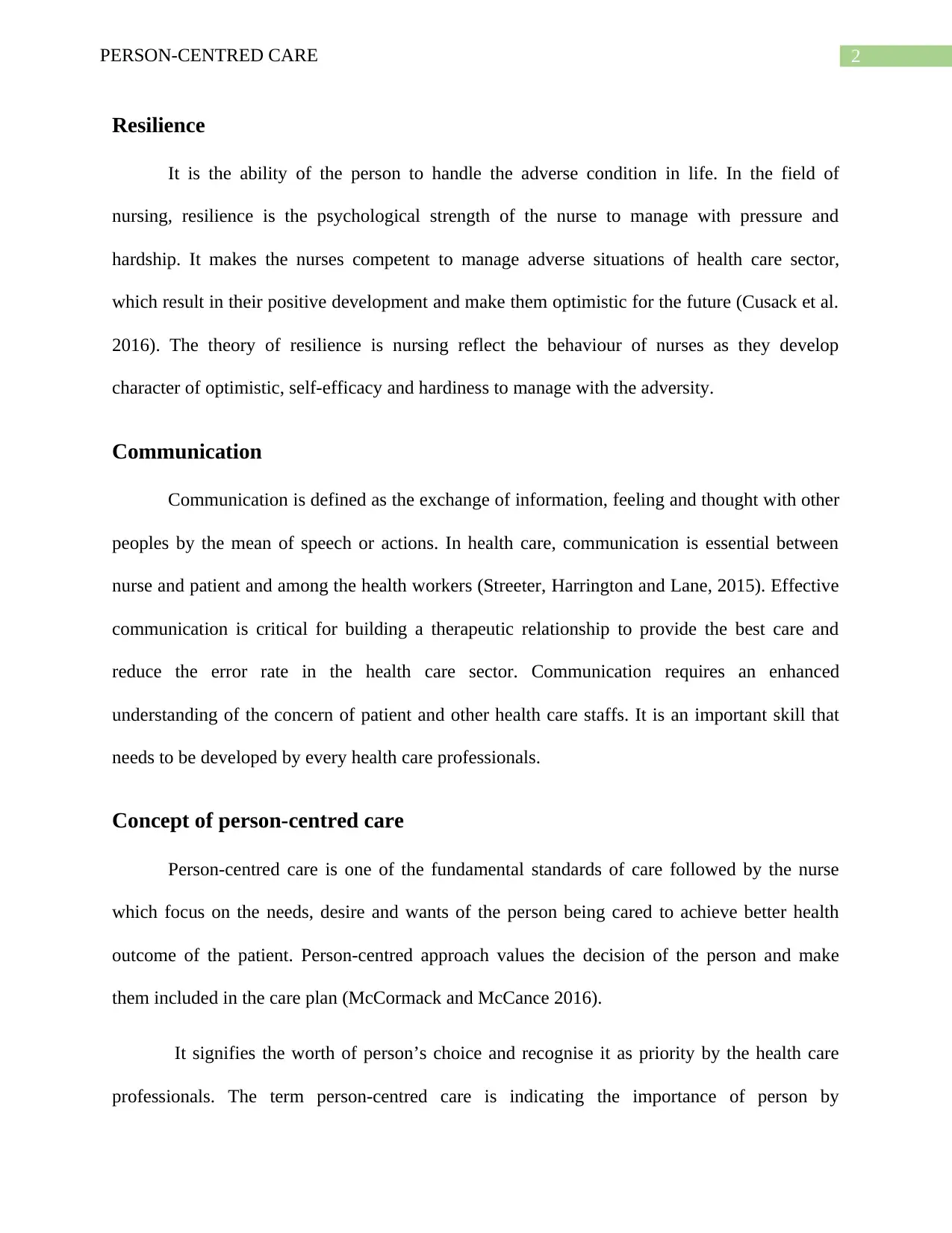
2PERSON‐CENTRED CARE
Resilience
It is the ability of the person to handle the adverse condition in life. In the field of
nursing, resilience is the psychological strength of the nurse to manage with pressure and
hardship. It makes the nurses competent to manage adverse situations of health care sector,
which result in their positive development and make them optimistic for the future (Cusack et al.
2016). The theory of resilience is nursing reflect the behaviour of nurses as they develop
character of optimistic, self-efficacy and hardiness to manage with the adversity.
Communication
Communication is defined as the exchange of information, feeling and thought with other
peoples by the mean of speech or actions. In health care, communication is essential between
nurse and patient and among the health workers (Streeter, Harrington and Lane, 2015). Effective
communication is critical for building a therapeutic relationship to provide the best care and
reduce the error rate in the health care sector. Communication requires an enhanced
understanding of the concern of patient and other health care staffs. It is an important skill that
needs to be developed by every health care professionals.
Concept of person-centred care
Person-centred care is one of the fundamental standards of care followed by the nurse
which focus on the needs, desire and wants of the person being cared to achieve better health
outcome of the patient. Person-centred approach values the decision of the person and make
them included in the care plan (McCormack and McCance 2016).
It signifies the worth of person’s choice and recognise it as priority by the health care
professionals. The term person-centred care is indicating the importance of person by
Resilience
It is the ability of the person to handle the adverse condition in life. In the field of
nursing, resilience is the psychological strength of the nurse to manage with pressure and
hardship. It makes the nurses competent to manage adverse situations of health care sector,
which result in their positive development and make them optimistic for the future (Cusack et al.
2016). The theory of resilience is nursing reflect the behaviour of nurses as they develop
character of optimistic, self-efficacy and hardiness to manage with the adversity.
Communication
Communication is defined as the exchange of information, feeling and thought with other
peoples by the mean of speech or actions. In health care, communication is essential between
nurse and patient and among the health workers (Streeter, Harrington and Lane, 2015). Effective
communication is critical for building a therapeutic relationship to provide the best care and
reduce the error rate in the health care sector. Communication requires an enhanced
understanding of the concern of patient and other health care staffs. It is an important skill that
needs to be developed by every health care professionals.
Concept of person-centred care
Person-centred care is one of the fundamental standards of care followed by the nurse
which focus on the needs, desire and wants of the person being cared to achieve better health
outcome of the patient. Person-centred approach values the decision of the person and make
them included in the care plan (McCormack and McCance 2016).
It signifies the worth of person’s choice and recognise it as priority by the health care
professionals. The term person-centred care is indicating the importance of person by
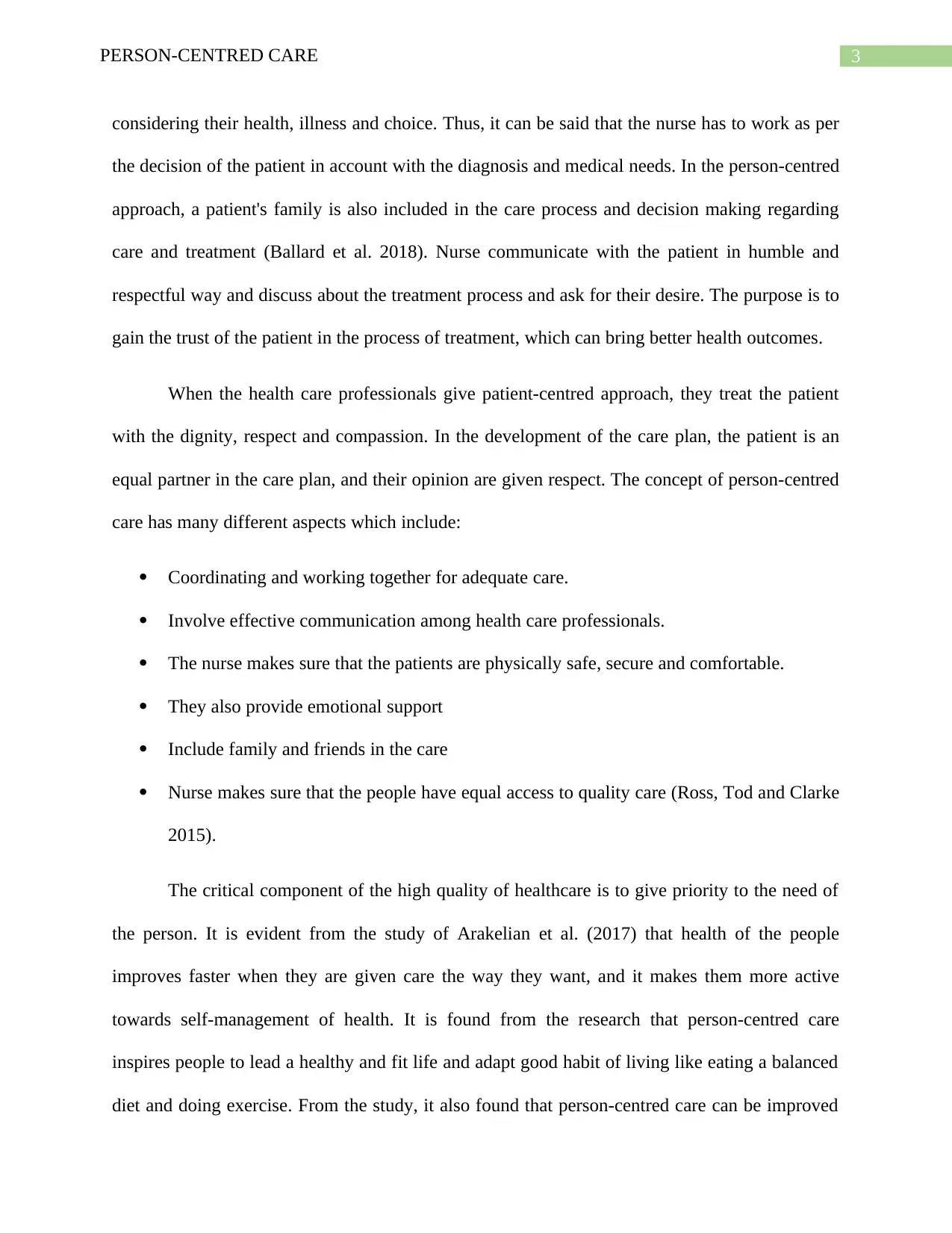
3PERSON‐CENTRED CARE
considering their health, illness and choice. Thus, it can be said that the nurse has to work as per
the decision of the patient in account with the diagnosis and medical needs. In the person-centred
approach, a patient's family is also included in the care process and decision making regarding
care and treatment (Ballard et al. 2018). Nurse communicate with the patient in humble and
respectful way and discuss about the treatment process and ask for their desire. The purpose is to
gain the trust of the patient in the process of treatment, which can bring better health outcomes.
When the health care professionals give patient-centred approach, they treat the patient
with the dignity, respect and compassion. In the development of the care plan, the patient is an
equal partner in the care plan, and their opinion are given respect. The concept of person-centred
care has many different aspects which include:
Coordinating and working together for adequate care.
Involve effective communication among health care professionals.
The nurse makes sure that the patients are physically safe, secure and comfortable.
They also provide emotional support
Include family and friends in the care
Nurse makes sure that the people have equal access to quality care (Ross, Tod and Clarke
2015).
The critical component of the high quality of healthcare is to give priority to the need of
the person. It is evident from the study of Arakelian et al. (2017) that health of the people
improves faster when they are given care the way they want, and it makes them more active
towards self-management of health. It is found from the research that person-centred care
inspires people to lead a healthy and fit life and adapt good habit of living like eating a balanced
diet and doing exercise. From the study, it also found that person-centred care can be improved
considering their health, illness and choice. Thus, it can be said that the nurse has to work as per
the decision of the patient in account with the diagnosis and medical needs. In the person-centred
approach, a patient's family is also included in the care process and decision making regarding
care and treatment (Ballard et al. 2018). Nurse communicate with the patient in humble and
respectful way and discuss about the treatment process and ask for their desire. The purpose is to
gain the trust of the patient in the process of treatment, which can bring better health outcomes.
When the health care professionals give patient-centred approach, they treat the patient
with the dignity, respect and compassion. In the development of the care plan, the patient is an
equal partner in the care plan, and their opinion are given respect. The concept of person-centred
care has many different aspects which include:
Coordinating and working together for adequate care.
Involve effective communication among health care professionals.
The nurse makes sure that the patients are physically safe, secure and comfortable.
They also provide emotional support
Include family and friends in the care
Nurse makes sure that the people have equal access to quality care (Ross, Tod and Clarke
2015).
The critical component of the high quality of healthcare is to give priority to the need of
the person. It is evident from the study of Arakelian et al. (2017) that health of the people
improves faster when they are given care the way they want, and it makes them more active
towards self-management of health. It is found from the research that person-centred care
inspires people to lead a healthy and fit life and adapt good habit of living like eating a balanced
diet and doing exercise. From the study, it also found that person-centred care can be improved
Secure Best Marks with AI Grader
Need help grading? Try our AI Grader for instant feedback on your assignments.
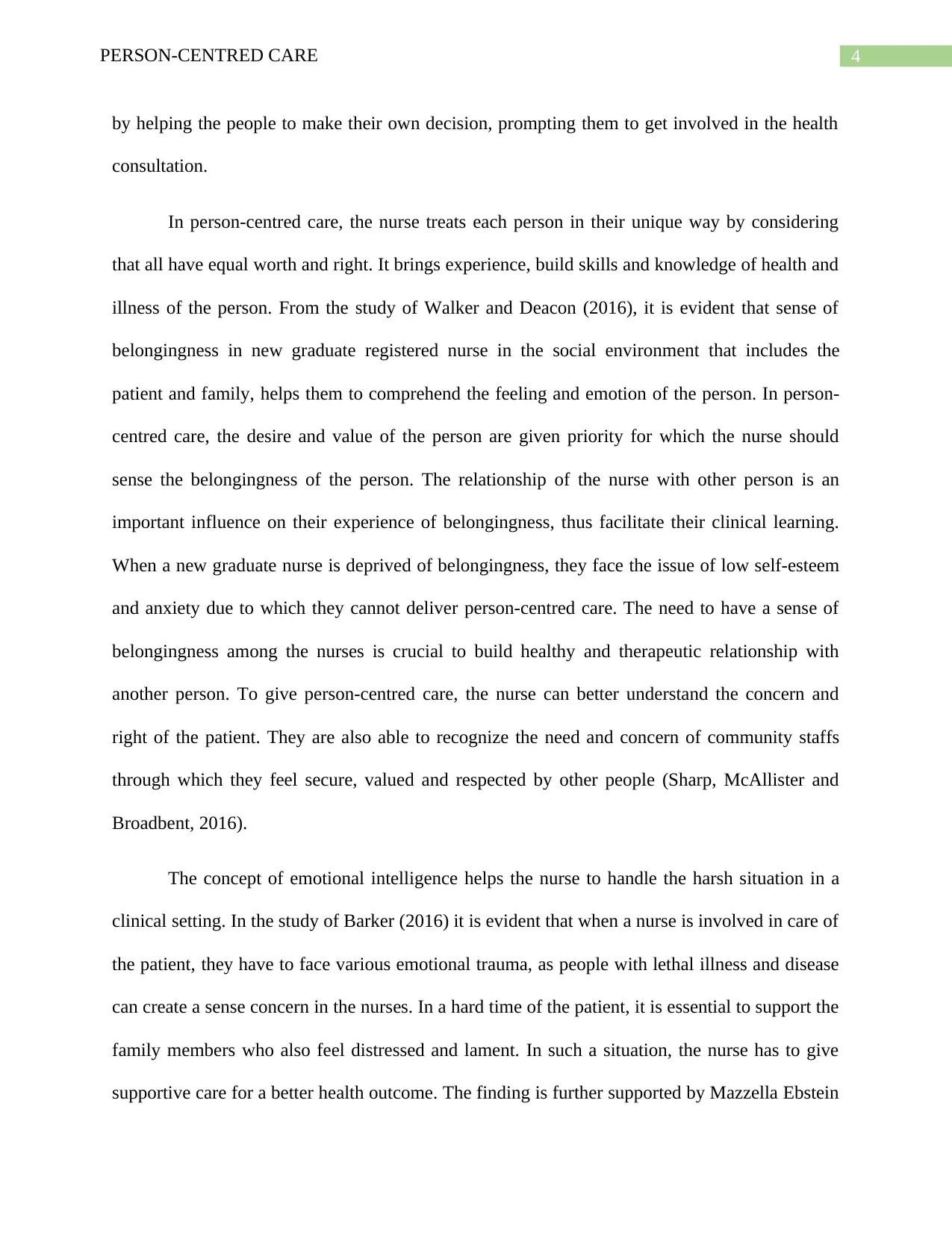
4PERSON‐CENTRED CARE
by helping the people to make their own decision, prompting them to get involved in the health
consultation.
In person-centred care, the nurse treats each person in their unique way by considering
that all have equal worth and right. It brings experience, build skills and knowledge of health and
illness of the person. From the study of Walker and Deacon (2016), it is evident that sense of
belongingness in new graduate registered nurse in the social environment that includes the
patient and family, helps them to comprehend the feeling and emotion of the person. In person-
centred care, the desire and value of the person are given priority for which the nurse should
sense the belongingness of the person. The relationship of the nurse with other person is an
important influence on their experience of belongingness, thus facilitate their clinical learning.
When a new graduate nurse is deprived of belongingness, they face the issue of low self-esteem
and anxiety due to which they cannot deliver person-centred care. The need to have a sense of
belongingness among the nurses is crucial to build healthy and therapeutic relationship with
another person. To give person-centred care, the nurse can better understand the concern and
right of the patient. They are also able to recognize the need and concern of community staffs
through which they feel secure, valued and respected by other people (Sharp, McAllister and
Broadbent, 2016).
The concept of emotional intelligence helps the nurse to handle the harsh situation in a
clinical setting. In the study of Barker (2016) it is evident that when a nurse is involved in care of
the patient, they have to face various emotional trauma, as people with lethal illness and disease
can create a sense concern in the nurses. In a hard time of the patient, it is essential to support the
family members who also feel distressed and lament. In such a situation, the nurse has to give
supportive care for a better health outcome. The finding is further supported by Mazzella Ebstein
by helping the people to make their own decision, prompting them to get involved in the health
consultation.
In person-centred care, the nurse treats each person in their unique way by considering
that all have equal worth and right. It brings experience, build skills and knowledge of health and
illness of the person. From the study of Walker and Deacon (2016), it is evident that sense of
belongingness in new graduate registered nurse in the social environment that includes the
patient and family, helps them to comprehend the feeling and emotion of the person. In person-
centred care, the desire and value of the person are given priority for which the nurse should
sense the belongingness of the person. The relationship of the nurse with other person is an
important influence on their experience of belongingness, thus facilitate their clinical learning.
When a new graduate nurse is deprived of belongingness, they face the issue of low self-esteem
and anxiety due to which they cannot deliver person-centred care. The need to have a sense of
belongingness among the nurses is crucial to build healthy and therapeutic relationship with
another person. To give person-centred care, the nurse can better understand the concern and
right of the patient. They are also able to recognize the need and concern of community staffs
through which they feel secure, valued and respected by other people (Sharp, McAllister and
Broadbent, 2016).
The concept of emotional intelligence helps the nurse to handle the harsh situation in a
clinical setting. In the study of Barker (2016) it is evident that when a nurse is involved in care of
the patient, they have to face various emotional trauma, as people with lethal illness and disease
can create a sense concern in the nurses. In a hard time of the patient, it is essential to support the
family members who also feel distressed and lament. In such a situation, the nurse has to give
supportive care for a better health outcome. The finding is further supported by Mazzella Ebstein
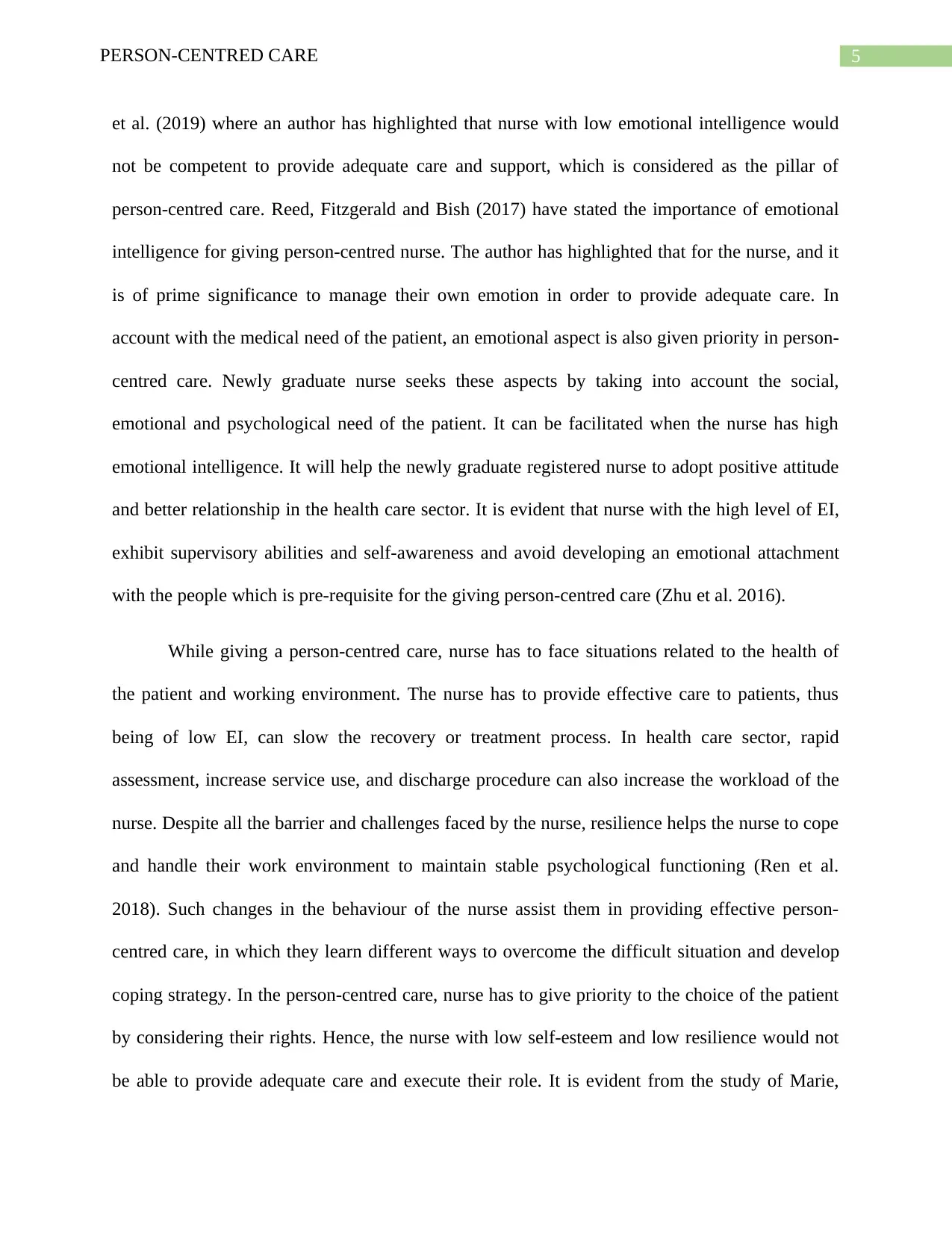
5PERSON‐CENTRED CARE
et al. (2019) where an author has highlighted that nurse with low emotional intelligence would
not be competent to provide adequate care and support, which is considered as the pillar of
person-centred care. Reed, Fitzgerald and Bish (2017) have stated the importance of emotional
intelligence for giving person-centred nurse. The author has highlighted that for the nurse, and it
is of prime significance to manage their own emotion in order to provide adequate care. In
account with the medical need of the patient, an emotional aspect is also given priority in person-
centred care. Newly graduate nurse seeks these aspects by taking into account the social,
emotional and psychological need of the patient. It can be facilitated when the nurse has high
emotional intelligence. It will help the newly graduate registered nurse to adopt positive attitude
and better relationship in the health care sector. It is evident that nurse with the high level of EI,
exhibit supervisory abilities and self-awareness and avoid developing an emotional attachment
with the people which is pre-requisite for the giving person-centred care (Zhu et al. 2016).
While giving a person-centred care, nurse has to face situations related to the health of
the patient and working environment. The nurse has to provide effective care to patients, thus
being of low EI, can slow the recovery or treatment process. In health care sector, rapid
assessment, increase service use, and discharge procedure can also increase the workload of the
nurse. Despite all the barrier and challenges faced by the nurse, resilience helps the nurse to cope
and handle their work environment to maintain stable psychological functioning (Ren et al.
2018). Such changes in the behaviour of the nurse assist them in providing effective person-
centred care, in which they learn different ways to overcome the difficult situation and develop
coping strategy. In the person-centred care, nurse has to give priority to the choice of the patient
by considering their rights. Hence, the nurse with low self-esteem and low resilience would not
be able to provide adequate care and execute their role. It is evident from the study of Marie,
et al. (2019) where an author has highlighted that nurse with low emotional intelligence would
not be competent to provide adequate care and support, which is considered as the pillar of
person-centred care. Reed, Fitzgerald and Bish (2017) have stated the importance of emotional
intelligence for giving person-centred nurse. The author has highlighted that for the nurse, and it
is of prime significance to manage their own emotion in order to provide adequate care. In
account with the medical need of the patient, an emotional aspect is also given priority in person-
centred care. Newly graduate nurse seeks these aspects by taking into account the social,
emotional and psychological need of the patient. It can be facilitated when the nurse has high
emotional intelligence. It will help the newly graduate registered nurse to adopt positive attitude
and better relationship in the health care sector. It is evident that nurse with the high level of EI,
exhibit supervisory abilities and self-awareness and avoid developing an emotional attachment
with the people which is pre-requisite for the giving person-centred care (Zhu et al. 2016).
While giving a person-centred care, nurse has to face situations related to the health of
the patient and working environment. The nurse has to provide effective care to patients, thus
being of low EI, can slow the recovery or treatment process. In health care sector, rapid
assessment, increase service use, and discharge procedure can also increase the workload of the
nurse. Despite all the barrier and challenges faced by the nurse, resilience helps the nurse to cope
and handle their work environment to maintain stable psychological functioning (Ren et al.
2018). Such changes in the behaviour of the nurse assist them in providing effective person-
centred care, in which they learn different ways to overcome the difficult situation and develop
coping strategy. In the person-centred care, nurse has to give priority to the choice of the patient
by considering their rights. Hence, the nurse with low self-esteem and low resilience would not
be able to provide adequate care and execute their role. It is evident from the study of Marie,
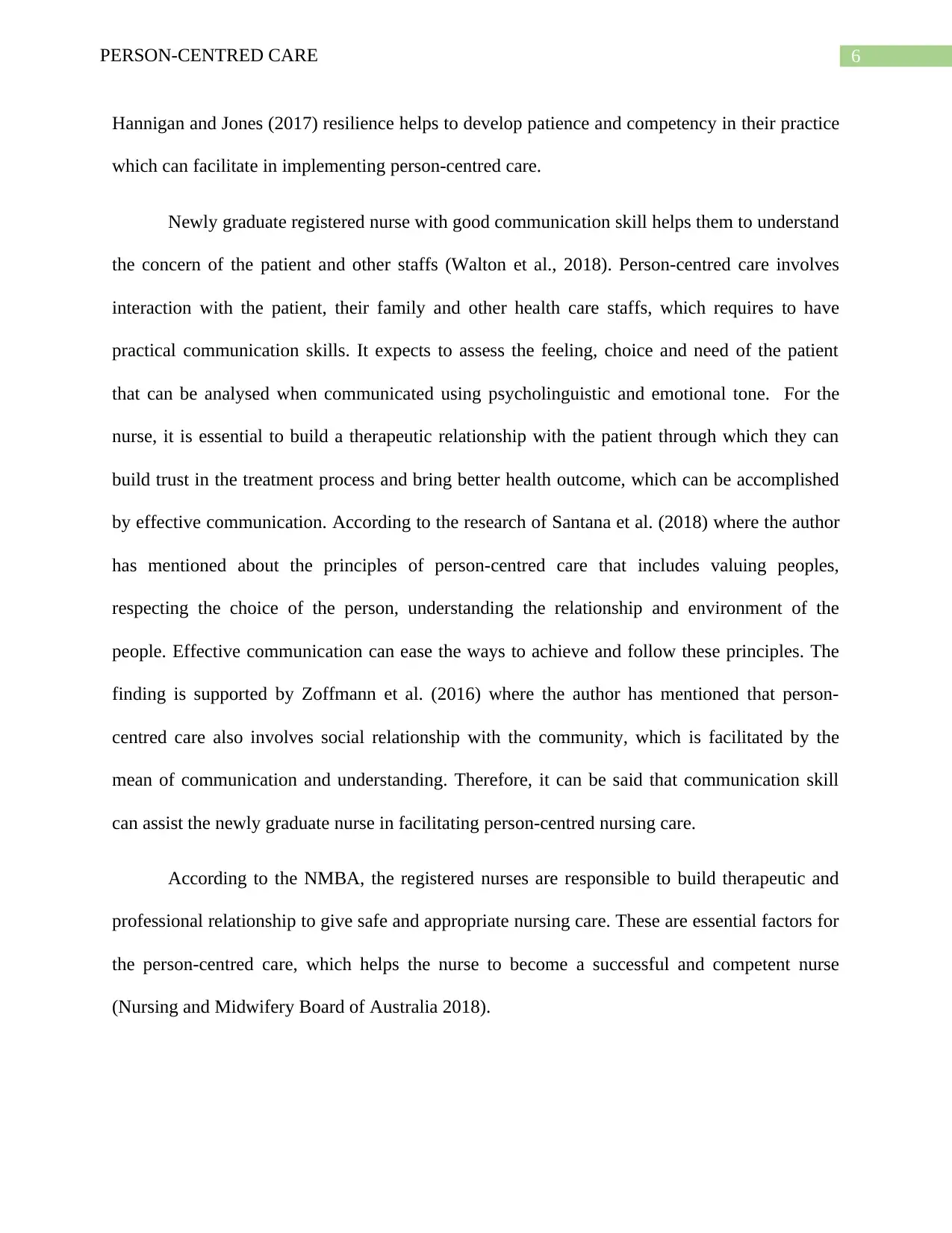
6PERSON‐CENTRED CARE
Hannigan and Jones (2017) resilience helps to develop patience and competency in their practice
which can facilitate in implementing person-centred care.
Newly graduate registered nurse with good communication skill helps them to understand
the concern of the patient and other staffs (Walton et al., 2018). Person-centred care involves
interaction with the patient, their family and other health care staffs, which requires to have
practical communication skills. It expects to assess the feeling, choice and need of the patient
that can be analysed when communicated using psycholinguistic and emotional tone. For the
nurse, it is essential to build a therapeutic relationship with the patient through which they can
build trust in the treatment process and bring better health outcome, which can be accomplished
by effective communication. According to the research of Santana et al. (2018) where the author
has mentioned about the principles of person-centred care that includes valuing peoples,
respecting the choice of the person, understanding the relationship and environment of the
people. Effective communication can ease the ways to achieve and follow these principles. The
finding is supported by Zoffmann et al. (2016) where the author has mentioned that person-
centred care also involves social relationship with the community, which is facilitated by the
mean of communication and understanding. Therefore, it can be said that communication skill
can assist the newly graduate nurse in facilitating person-centred nursing care.
According to the NMBA, the registered nurses are responsible to build therapeutic and
professional relationship to give safe and appropriate nursing care. These are essential factors for
the person-centred care, which helps the nurse to become a successful and competent nurse
(Nursing and Midwifery Board of Australia 2018).
Hannigan and Jones (2017) resilience helps to develop patience and competency in their practice
which can facilitate in implementing person-centred care.
Newly graduate registered nurse with good communication skill helps them to understand
the concern of the patient and other staffs (Walton et al., 2018). Person-centred care involves
interaction with the patient, their family and other health care staffs, which requires to have
practical communication skills. It expects to assess the feeling, choice and need of the patient
that can be analysed when communicated using psycholinguistic and emotional tone. For the
nurse, it is essential to build a therapeutic relationship with the patient through which they can
build trust in the treatment process and bring better health outcome, which can be accomplished
by effective communication. According to the research of Santana et al. (2018) where the author
has mentioned about the principles of person-centred care that includes valuing peoples,
respecting the choice of the person, understanding the relationship and environment of the
people. Effective communication can ease the ways to achieve and follow these principles. The
finding is supported by Zoffmann et al. (2016) where the author has mentioned that person-
centred care also involves social relationship with the community, which is facilitated by the
mean of communication and understanding. Therefore, it can be said that communication skill
can assist the newly graduate nurse in facilitating person-centred nursing care.
According to the NMBA, the registered nurses are responsible to build therapeutic and
professional relationship to give safe and appropriate nursing care. These are essential factors for
the person-centred care, which helps the nurse to become a successful and competent nurse
(Nursing and Midwifery Board of Australia 2018).
Paraphrase This Document
Need a fresh take? Get an instant paraphrase of this document with our AI Paraphraser
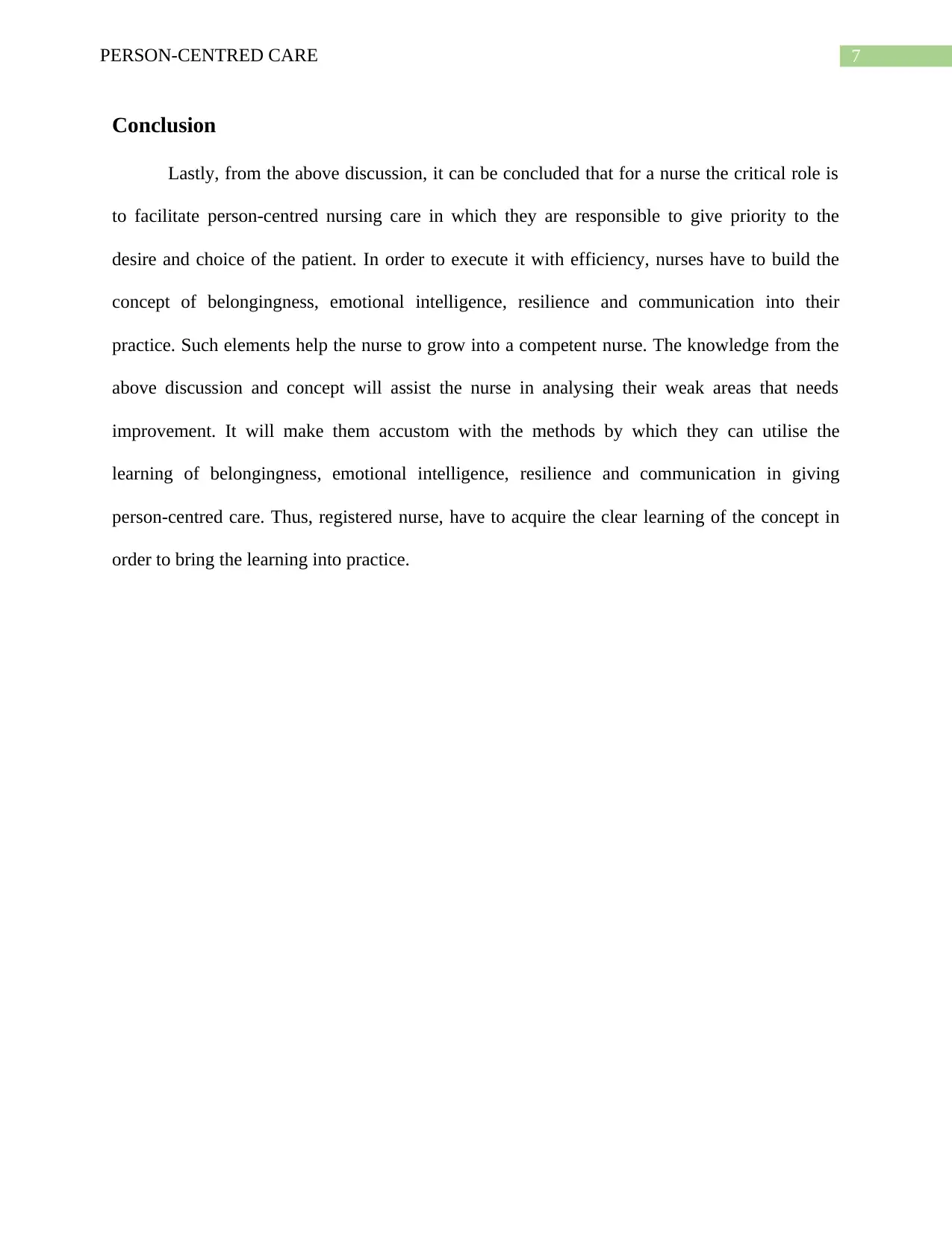
7PERSON‐CENTRED CARE
Conclusion
Lastly, from the above discussion, it can be concluded that for a nurse the critical role is
to facilitate person-centred nursing care in which they are responsible to give priority to the
desire and choice of the patient. In order to execute it with efficiency, nurses have to build the
concept of belongingness, emotional intelligence, resilience and communication into their
practice. Such elements help the nurse to grow into a competent nurse. The knowledge from the
above discussion and concept will assist the nurse in analysing their weak areas that needs
improvement. It will make them accustom with the methods by which they can utilise the
learning of belongingness, emotional intelligence, resilience and communication in giving
person-centred care. Thus, registered nurse, have to acquire the clear learning of the concept in
order to bring the learning into practice.
Conclusion
Lastly, from the above discussion, it can be concluded that for a nurse the critical role is
to facilitate person-centred nursing care in which they are responsible to give priority to the
desire and choice of the patient. In order to execute it with efficiency, nurses have to build the
concept of belongingness, emotional intelligence, resilience and communication into their
practice. Such elements help the nurse to grow into a competent nurse. The knowledge from the
above discussion and concept will assist the nurse in analysing their weak areas that needs
improvement. It will make them accustom with the methods by which they can utilise the
learning of belongingness, emotional intelligence, resilience and communication in giving
person-centred care. Thus, registered nurse, have to acquire the clear learning of the concept in
order to bring the learning into practice.
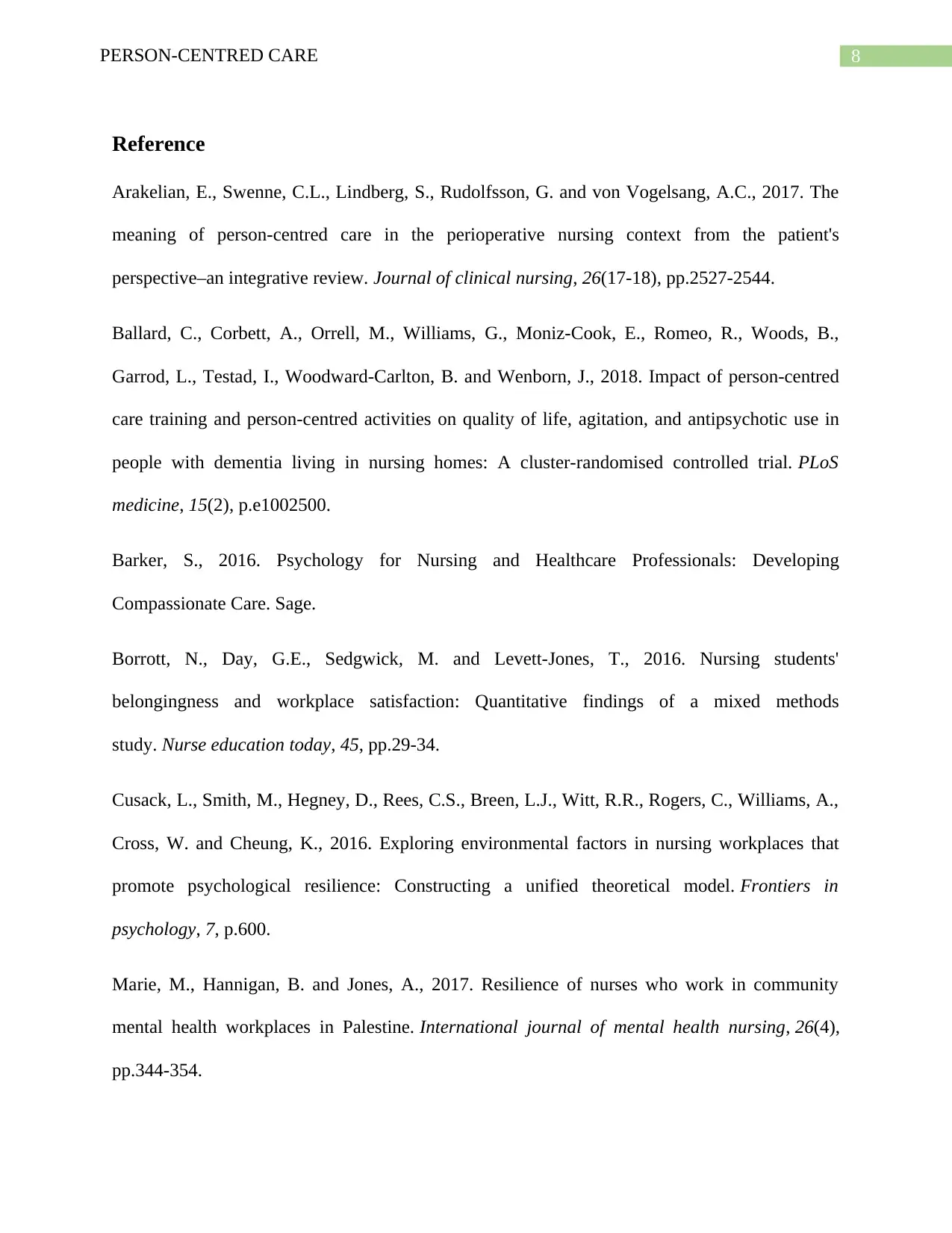
8PERSON‐CENTRED CARE
Reference
Arakelian, E., Swenne, C.L., Lindberg, S., Rudolfsson, G. and von Vogelsang, A.C., 2017. The
meaning of person‐centred care in the perioperative nursing context from the patient's
perspective–an integrative review. Journal of clinical nursing, 26(17-18), pp.2527-2544.
Ballard, C., Corbett, A., Orrell, M., Williams, G., Moniz-Cook, E., Romeo, R., Woods, B.,
Garrod, L., Testad, I., Woodward-Carlton, B. and Wenborn, J., 2018. Impact of person-centred
care training and person-centred activities on quality of life, agitation, and antipsychotic use in
people with dementia living in nursing homes: A cluster-randomised controlled trial. PLoS
medicine, 15(2), p.e1002500.
Barker, S., 2016. Psychology for Nursing and Healthcare Professionals: Developing
Compassionate Care. Sage.
Borrott, N., Day, G.E., Sedgwick, M. and Levett-Jones, T., 2016. Nursing students'
belongingness and workplace satisfaction: Quantitative findings of a mixed methods
study. Nurse education today, 45, pp.29-34.
Cusack, L., Smith, M., Hegney, D., Rees, C.S., Breen, L.J., Witt, R.R., Rogers, C., Williams, A.,
Cross, W. and Cheung, K., 2016. Exploring environmental factors in nursing workplaces that
promote psychological resilience: Constructing a unified theoretical model. Frontiers in
psychology, 7, p.600.
Marie, M., Hannigan, B. and Jones, A., 2017. Resilience of nurses who work in community
mental health workplaces in Palestine. International journal of mental health nursing, 26(4),
pp.344-354.
Reference
Arakelian, E., Swenne, C.L., Lindberg, S., Rudolfsson, G. and von Vogelsang, A.C., 2017. The
meaning of person‐centred care in the perioperative nursing context from the patient's
perspective–an integrative review. Journal of clinical nursing, 26(17-18), pp.2527-2544.
Ballard, C., Corbett, A., Orrell, M., Williams, G., Moniz-Cook, E., Romeo, R., Woods, B.,
Garrod, L., Testad, I., Woodward-Carlton, B. and Wenborn, J., 2018. Impact of person-centred
care training and person-centred activities on quality of life, agitation, and antipsychotic use in
people with dementia living in nursing homes: A cluster-randomised controlled trial. PLoS
medicine, 15(2), p.e1002500.
Barker, S., 2016. Psychology for Nursing and Healthcare Professionals: Developing
Compassionate Care. Sage.
Borrott, N., Day, G.E., Sedgwick, M. and Levett-Jones, T., 2016. Nursing students'
belongingness and workplace satisfaction: Quantitative findings of a mixed methods
study. Nurse education today, 45, pp.29-34.
Cusack, L., Smith, M., Hegney, D., Rees, C.S., Breen, L.J., Witt, R.R., Rogers, C., Williams, A.,
Cross, W. and Cheung, K., 2016. Exploring environmental factors in nursing workplaces that
promote psychological resilience: Constructing a unified theoretical model. Frontiers in
psychology, 7, p.600.
Marie, M., Hannigan, B. and Jones, A., 2017. Resilience of nurses who work in community
mental health workplaces in Palestine. International journal of mental health nursing, 26(4),
pp.344-354.
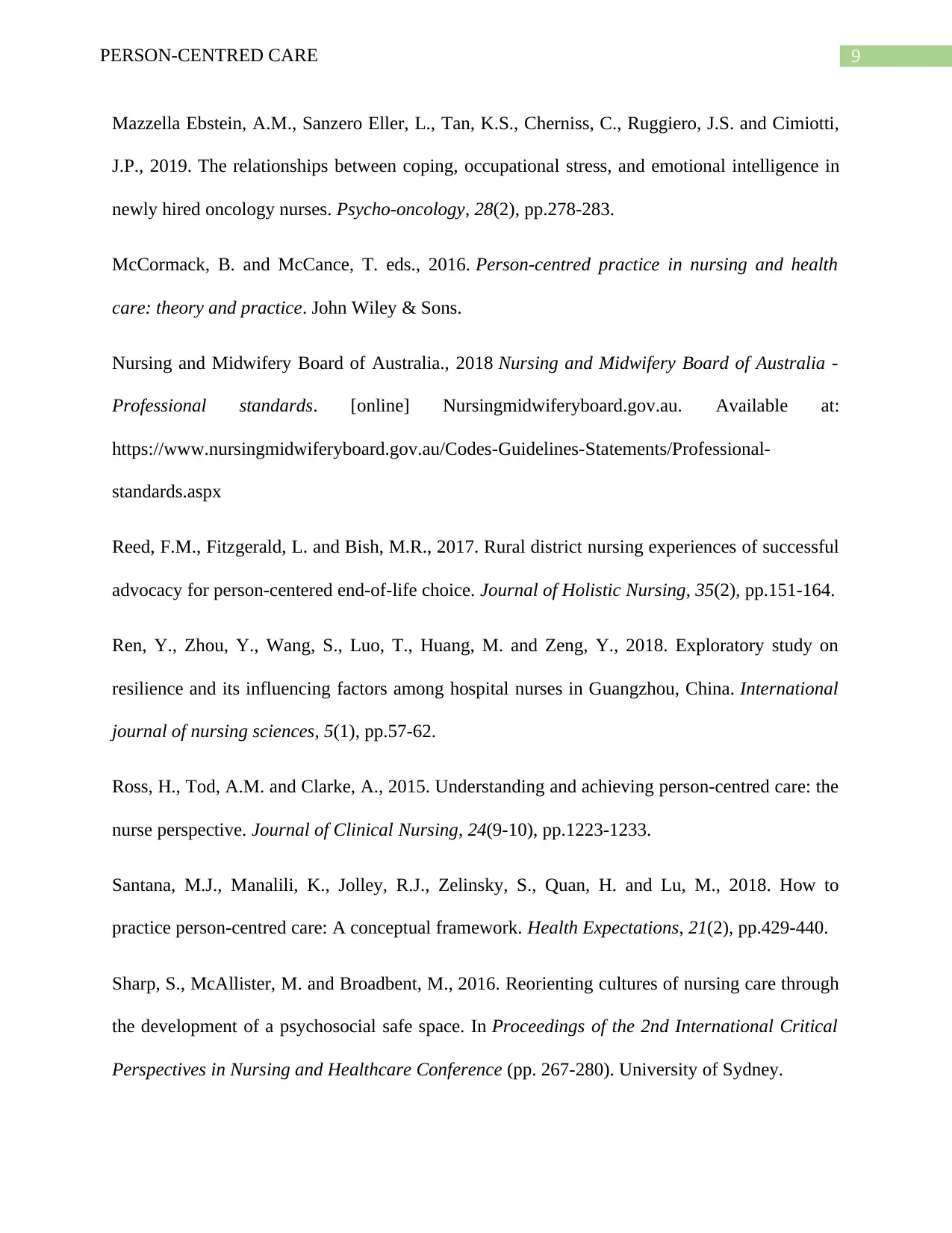
9PERSON‐CENTRED CARE
Mazzella Ebstein, A.M., Sanzero Eller, L., Tan, K.S., Cherniss, C., Ruggiero, J.S. and Cimiotti,
J.P., 2019. The relationships between coping, occupational stress, and emotional intelligence in
newly hired oncology nurses. Psycho‐oncology, 28(2), pp.278-283.
McCormack, B. and McCance, T. eds., 2016. Person-centred practice in nursing and health
care: theory and practice. John Wiley & Sons.
Nursing and Midwifery Board of Australia., 2018 Nursing and Midwifery Board of Australia -
Professional standards. [online] Nursingmidwiferyboard.gov.au. Available at:
https://www.nursingmidwiferyboard.gov.au/Codes-Guidelines-Statements/Professional-
standards.aspx
Reed, F.M., Fitzgerald, L. and Bish, M.R., 2017. Rural district nursing experiences of successful
advocacy for person-centered end-of-life choice. Journal of Holistic Nursing, 35(2), pp.151-164.
Ren, Y., Zhou, Y., Wang, S., Luo, T., Huang, M. and Zeng, Y., 2018. Exploratory study on
resilience and its influencing factors among hospital nurses in Guangzhou, China. International
journal of nursing sciences, 5(1), pp.57-62.
Ross, H., Tod, A.M. and Clarke, A., 2015. Understanding and achieving person‐centred care: the
nurse perspective. Journal of Clinical Nursing, 24(9-10), pp.1223-1233.
Santana, M.J., Manalili, K., Jolley, R.J., Zelinsky, S., Quan, H. and Lu, M., 2018. How to
practice person‐centred care: A conceptual framework. Health Expectations, 21(2), pp.429-440.
Sharp, S., McAllister, M. and Broadbent, M., 2016. Reorienting cultures of nursing care through
the development of a psychosocial safe space. In Proceedings of the 2nd International Critical
Perspectives in Nursing and Healthcare Conference (pp. 267-280). University of Sydney.
Mazzella Ebstein, A.M., Sanzero Eller, L., Tan, K.S., Cherniss, C., Ruggiero, J.S. and Cimiotti,
J.P., 2019. The relationships between coping, occupational stress, and emotional intelligence in
newly hired oncology nurses. Psycho‐oncology, 28(2), pp.278-283.
McCormack, B. and McCance, T. eds., 2016. Person-centred practice in nursing and health
care: theory and practice. John Wiley & Sons.
Nursing and Midwifery Board of Australia., 2018 Nursing and Midwifery Board of Australia -
Professional standards. [online] Nursingmidwiferyboard.gov.au. Available at:
https://www.nursingmidwiferyboard.gov.au/Codes-Guidelines-Statements/Professional-
standards.aspx
Reed, F.M., Fitzgerald, L. and Bish, M.R., 2017. Rural district nursing experiences of successful
advocacy for person-centered end-of-life choice. Journal of Holistic Nursing, 35(2), pp.151-164.
Ren, Y., Zhou, Y., Wang, S., Luo, T., Huang, M. and Zeng, Y., 2018. Exploratory study on
resilience and its influencing factors among hospital nurses in Guangzhou, China. International
journal of nursing sciences, 5(1), pp.57-62.
Ross, H., Tod, A.M. and Clarke, A., 2015. Understanding and achieving person‐centred care: the
nurse perspective. Journal of Clinical Nursing, 24(9-10), pp.1223-1233.
Santana, M.J., Manalili, K., Jolley, R.J., Zelinsky, S., Quan, H. and Lu, M., 2018. How to
practice person‐centred care: A conceptual framework. Health Expectations, 21(2), pp.429-440.
Sharp, S., McAllister, M. and Broadbent, M., 2016. Reorienting cultures of nursing care through
the development of a psychosocial safe space. In Proceedings of the 2nd International Critical
Perspectives in Nursing and Healthcare Conference (pp. 267-280). University of Sydney.
Secure Best Marks with AI Grader
Need help grading? Try our AI Grader for instant feedback on your assignments.
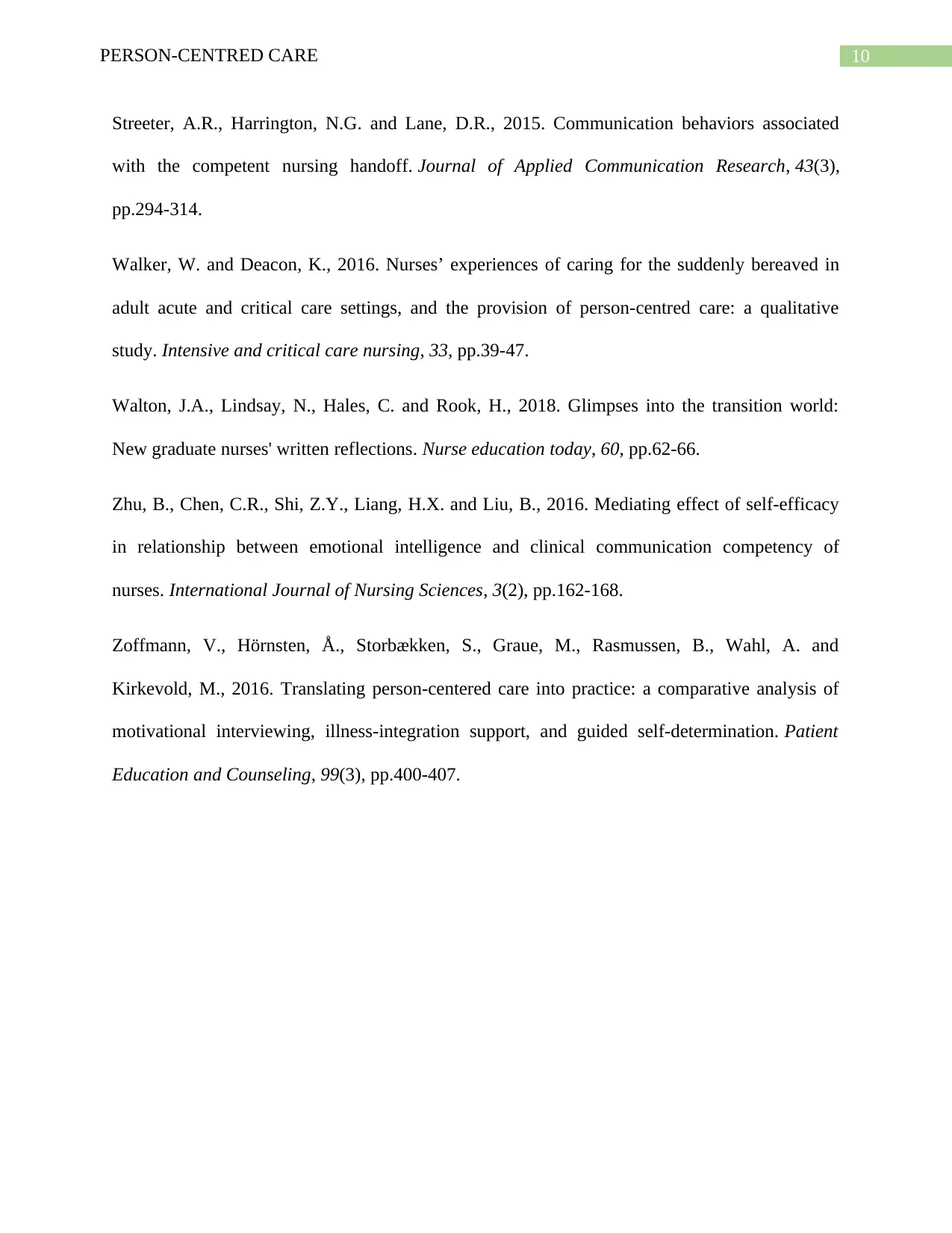
10PERSON‐CENTRED CARE
Streeter, A.R., Harrington, N.G. and Lane, D.R., 2015. Communication behaviors associated
with the competent nursing handoff. Journal of Applied Communication Research, 43(3),
pp.294-314.
Walker, W. and Deacon, K., 2016. Nurses’ experiences of caring for the suddenly bereaved in
adult acute and critical care settings, and the provision of person-centred care: a qualitative
study. Intensive and critical care nursing, 33, pp.39-47.
Walton, J.A., Lindsay, N., Hales, C. and Rook, H., 2018. Glimpses into the transition world:
New graduate nurses' written reflections. Nurse education today, 60, pp.62-66.
Zhu, B., Chen, C.R., Shi, Z.Y., Liang, H.X. and Liu, B., 2016. Mediating effect of self-efficacy
in relationship between emotional intelligence and clinical communication competency of
nurses. International Journal of Nursing Sciences, 3(2), pp.162-168.
Zoffmann, V., Hörnsten, Å., Storbækken, S., Graue, M., Rasmussen, B., Wahl, A. and
Kirkevold, M., 2016. Translating person-centered care into practice: a comparative analysis of
motivational interviewing, illness-integration support, and guided self-determination. Patient
Education and Counseling, 99(3), pp.400-407.
Streeter, A.R., Harrington, N.G. and Lane, D.R., 2015. Communication behaviors associated
with the competent nursing handoff. Journal of Applied Communication Research, 43(3),
pp.294-314.
Walker, W. and Deacon, K., 2016. Nurses’ experiences of caring for the suddenly bereaved in
adult acute and critical care settings, and the provision of person-centred care: a qualitative
study. Intensive and critical care nursing, 33, pp.39-47.
Walton, J.A., Lindsay, N., Hales, C. and Rook, H., 2018. Glimpses into the transition world:
New graduate nurses' written reflections. Nurse education today, 60, pp.62-66.
Zhu, B., Chen, C.R., Shi, Z.Y., Liang, H.X. and Liu, B., 2016. Mediating effect of self-efficacy
in relationship between emotional intelligence and clinical communication competency of
nurses. International Journal of Nursing Sciences, 3(2), pp.162-168.
Zoffmann, V., Hörnsten, Å., Storbækken, S., Graue, M., Rasmussen, B., Wahl, A. and
Kirkevold, M., 2016. Translating person-centered care into practice: a comparative analysis of
motivational interviewing, illness-integration support, and guided self-determination. Patient
Education and Counseling, 99(3), pp.400-407.
1 out of 11
Related Documents
Your All-in-One AI-Powered Toolkit for Academic Success.
+13062052269
info@desklib.com
Available 24*7 on WhatsApp / Email
![[object Object]](/_next/static/media/star-bottom.7253800d.svg)
Unlock your academic potential
© 2024 | Zucol Services PVT LTD | All rights reserved.





